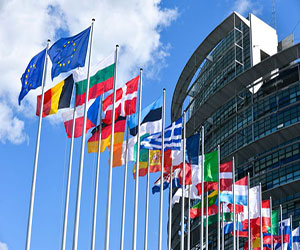Another landslide victory for Fidesz. That is the outcome of the April 3 national elections. Not only that the ruling coalition has kept its two-thirds constitutional majority in the National Assembly, but it even managed to increase the number of its mandates.
This result was completely unexpected. Even PM Orbán looked surprised when he declared his party’s victory on the night of the election. Just a few weeks ago, the Hungarian human rights journal, Fundamentum, published a special issue with the writings of leading Hungarian intellectuals on the constitutional means and potential consequences of a regime change brought about by the opposition’s victory. The international audience could follow a similar debate launched by Prof. Arató and Prof. Sajó on Verfassungsblog. Well, the constitutional regime change was eventually postponed due to lack of interest.
“Alright, then we will live here.”- says the mother of two watching her husband flee the country with the assistance of the Red Cross after the suppression of the 1956 revolution by the Soviet troops in one of the best Hungarian movies ever made “Time stands still” (1982). The social media platforms are flooded with this quote posted by disappointed voters who expect that Orbán’s regime democratic backsliding will continue in the next four years.
Nobody can predict the future, of course. Nevertheless, based on the characteristics of the current Hungarian political regime and the major trends of the last 12 years, one can take some educated guesses as to what the future may bring. In this short piece I argue that in the next parliamentary term, the Orbán-regime will most probably be less democratic than ever before.
Let me start by admitting that based on the results of the election, Fidesz does enjoy the support of the absolute majority of the voters. The turnout was 69,54%, and 53% of the voters chose Fidesz. For the ruling coalition this is a better result than the outcome of the 2018 elections with a slightly higher turnout (70,22%) but only 49,3% of the popular vote. Four years ago, the opposition could argue that Fidesz won the two-thirds of the parliamentary mandates only because of the significantly disproportionate character of the electoral system which compensated even the winner(!), but in fact was not backed by the absolute majority of the voters. This argument does not work anymore. So, in this sense (but in this sense alone), the incoming Orbán government will be more democratic.
Nevertheless, if we are willing to look behind the numbers and take into account the legal and political context, we can clearly see that the elections were free, but definitely not fair. Due to the efforts of several domestic and international civil society and political actors, including 62 members of the European Parliament coming from 5 political groups and from 19 different countries, the OSCE ODIHR decided to send a full-scale election observation mission to Hungary. Even though the final report is not yet out, the interim report and the preliminary conclusions noted that the 2022 “parliamentary elections […] were well administered and professionally managed but marred by the absence of a level playing field.” The lack of transparency and insufficient oversight of campaign finances, the bias and lack of balance in monitored news coverage and the absence of debates between major contestants, the lack of a clear distinction between the state and the ruling party, the way many election disputes were handled by election commissions and courts, the shortcoming of the legal framework, etc. benefited the governing coalition and put the opposition parties in a very disadvantageous position. It was arguably the least fair Hungarian parliamentary election in the 32-year-long post-dictatorship history of the country.
In addition, this will be the first parliamentary term that a Russian-style fake opposition party sits in the National Assembly. Fidesz has a long history of incentivizing the creation of business parties to divide the opposition voters and to create confusion. But the big surprise of the present elections was that the far-right party, Our Home (Mi Hazánk), managed to overcome the 5% electoral threshold and will thus send 7 representatives to the parliament. Our Home was established after the 2018 elections when the extreme right-wing Jobbik split into two groups: those who were resolute in turning the party into a more mainstream political formation and in 2021 joined the alliance of the opposition called United for Hungary (Egységben Magyarországért), and the hard-liners, who created a new nationalist party which became a Fidesz ally in disguise, a convenient solution for Orbán to outsource its more radical ideas (such as the anti-vaccination campaign) and to place a nationalist party to its right. Even some prominent members of the far-right political movements admit that the existence of this new political entity is actually beneficial to Fidesz.
One of the most visible signs of the governing coalition’s lack of democratic commitment was its permanent refusal to engage in any meaningful cooperation with the political opposition (see e.g., the Venice Commission’s opinion on the most important legislative reforms, such as the enactment of the new constitution). It showed no self-restraint whatsoever when it unilaterally re-regulated complete areas of law and selected even the most significant public officials by relying on its two-thirds majority alone (contrary to the constitutional purpose of this requirement). When its qualified majority melted temporarily (between 2015-2018), Fidesz was reluctantly willing to offer a deal to one of the opposition parties, Politics Can Be Different (LMP) (e.g., for the election of new constitutional court members), but only when it did not have any procedural tricks up its sleeve. With Our Home in the National Assembly, the Fidesz majority can imitate the cooperation with the opposition if needed.
What is more, the trend of outsourcing decision-making authority in some of most important legislative matters to non-parliamentary entities will most probably continue. One very visible sign of this tendency was the so-called “privatization” of state universities, i.e., the delegation of the rights of control to asset management foundations established by the state and filled with Fidesz appointees. It was mainly the FreeSZFE movement that made international news when the students of the University for Theater and Film Arts occupied their institution as a symbolic response to the attacks on the freedom of the arts and sciences. But in fact, the parliament has only indirect influence on the operation of the vast majority of the previously state-owned higher education institutions. And the remaining two largest public universities, the University of Technology and Economics and the Eötvös Lóránd University, will soon follow.
The democratic character of legislative decision-making is further eroded by the fact that a state emergency has been in force almost uninterruptedly since the beginning of the pandemic in March 2020. The government has used its extraordinary legislative power to regulate many important legislative matters which are completely unrelated to the pandemic in government decrees, and to further concentrate its political power e.g. by weakening the local governments. The current state of emergency is set to expire on 1 June 2022, but nothing prevents the ruling majority from extending the deadline of the authorization again and continuing to rule by decrees.
In light of these trends, democracy in Hungary is nothing but an illusion and will probably continue to be in the next four years. The incoming National Assembly has very questionable legitimacy since its members were elected in a manifestly unfair electoral process. The ruling majority will be able to rely on a fake opposition party if it wants to imitate a compromise-seeking style of decision-making, while the genuinely democratic opposition parties will remain deprived of any effective means to control the government. Political power will still be extremely centralized in the hands of the prime minister, who is not counterbalanced by any other political power center. And the media won’t be able fulfill its democratic mandate because it is largely controlled either directly by the government or by companies affiliated with Fidesz. In these circumstances the opposition parties should seriously consider boycotting the National Assembly, because the parliamentary work has completely lost its value and participation in this mockery only legitimizes an anti-democratic regime.
Change of regime in Hungary: postponed due to lack of interest






















